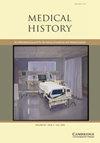Physicians imprisoned in Franco Spain’s Miranda de Ebro “Campo de Concentración”
IF 1.1
2区 哲学
Q4 HEALTH CARE SCIENCES & SERVICES
引用次数: 0
Abstract
Abstract Miranda de Ebro was created in 1937 to imprison Republicans and foreigners who fought with the International Brigades in Spanish Civil War. From 1940, the camp was used only to concentrate detained foreign refugees with no proper documents. More than 15 000 people, most of them from France and Poland, were kept there until the camp was closed in January 1947. Playing both sides of the international divide, fascist Spain at various points in time allowed passage and was a country of refuge both for those escaping Nazism and for Nazis and collaborators who, at the end of World War II (WWII), sought to escape justice. Treatment of each of these groups passing through Miranda was very different: real repression was meted out to the members of the International Brigades (IB), tolerance shown towards those escaping Nazism, and protection and active cooperation given to former Nazis and their collaborators. For the first time, data about foreign physicians imprisoned in Miranda de Ebro were consulted in the Guadalajara Military Archive (Spain). From 1937 to 1947, 151 doctors were imprisoned, most of them in 1942 and 1943, which represents around 1% of the prisoners. Fifty-two of the doctors were released thanks to diplomatic efforts, thirty-two by the Red Cross, and ten were sent to other prisons, directly released or managed to escape. All of them survived. After consulting private and public archives, it was possible to reconstruct some biographies and fill the previous existing gap in the history of migration and exile of doctors during the Second World War.医生被关押在佛朗哥西班牙的米兰达·德·埃布罗“集中营”
米兰达·德·埃布罗监狱成立于1937年,目的是监禁在西班牙内战中与国际旅一起作战的共和派和外国人。从1940年起,该集中营只用于关押没有合法证件的外国难民。超过15000人,其中大部分来自法国和波兰,被关押在那里,直到1947年1月集中营关闭。在国际分歧的两边,法西斯主义的西班牙在不同的时间点允许通过,成为逃离纳粹主义的人的避难所,也成为二战结束时试图逃避正义的纳粹分子及其合作者的避难所。对经过米兰达的每一个群体的待遇都非常不同:对国际旅(IB)成员进行了真正的镇压,对逃离纳粹主义的人表现出宽容,对前纳粹分子及其合作者给予保护和积极合作。瓜达拉哈拉军事档案馆(西班牙)第一次查阅了关押在Miranda de Ebro的外国医生的数据。从1937年到1947年,151名医生被监禁,其中大部分是在1942年和1943年,约占囚犯的1%。52名医生通过外交努力获释,32名通过红十字会获释,10名被送往其他监狱,或直接获释,或设法逃脱。他们都活了下来。在查阅了私人和公共档案后,有可能重建一些传记,并填补了第二次世界大战期间医生移民和流亡史上先前存在的空白。
本文章由计算机程序翻译,如有差异,请以英文原文为准。
求助全文
约1分钟内获得全文
求助全文
来源期刊

Medical History
医学-科学史与科学哲学
CiteScore
1.60
自引率
0.00%
发文量
25
审稿时长
>12 weeks
期刊介绍:
Medical History is a refereed journal devoted to all aspects of the history of medicine and health, with the goal of broadening and deepening the understanding of the field, in the widest sense, by historical studies of the highest quality. It is also the journal of the European Association for the History of Medicine and Health. The membership of the Editorial Board, which includes senior members of the EAHMH, reflects the commitment to the finest international standards in refereeing of submitted papers and the reviewing of books. The journal publishes in English, but welcomes submissions from scholars for whom English is not a first language; language and copy-editing assistance will be provided wherever possible.
 求助内容:
求助内容: 应助结果提醒方式:
应助结果提醒方式:


